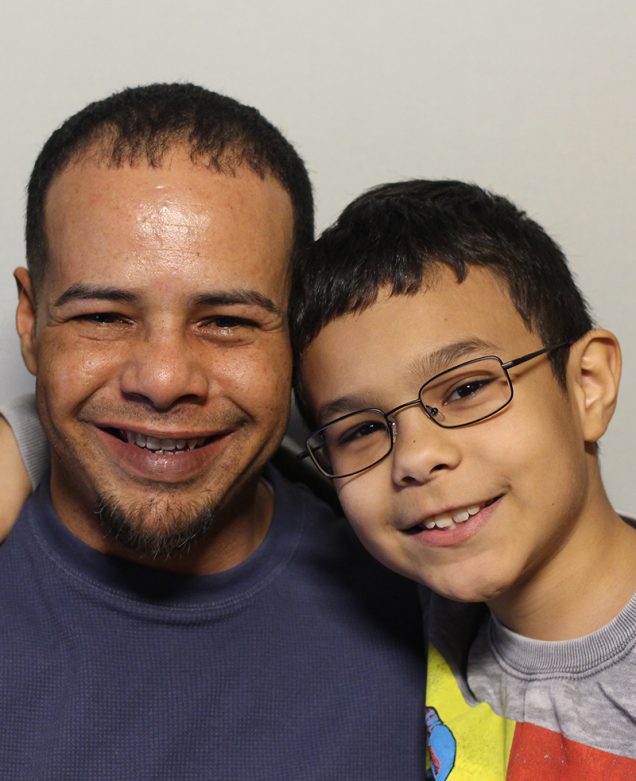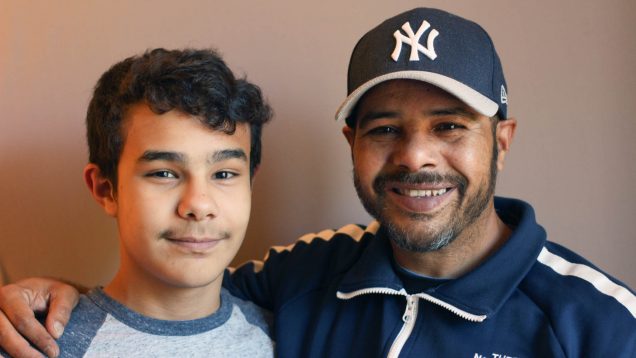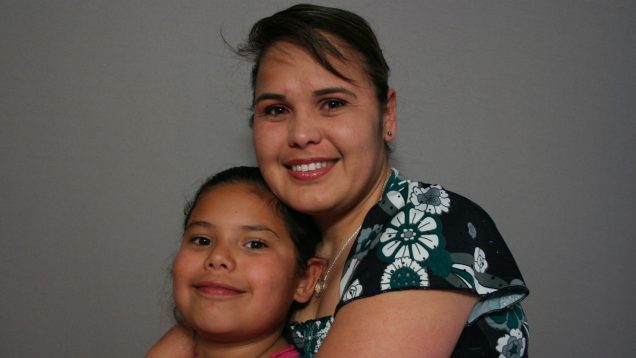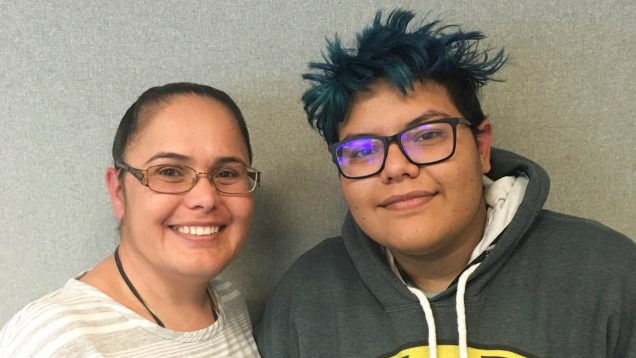<PREROLL>
<THEME MUSIC>
With recent news reports of troops being deployed to the Middle East… we’re thinking about those who serve and sacrifice.
It’s the StoryCorps podcast from NPR… I’m Jasmyn Morris…
On this week’s episode… we’ll hear from veterans and their families as they navigate difficult conversations around deployment and the transition back to civilian life…
<MUSIC BEAT>
Ernesto Rodriguez enlisted in the Marine Corps in 2000. When he deployed to Iraq five years later… he had just become a father.
And being away from home was challenging…not just for Ernesto… but for his whole family.
So a few years after he left the military… he came to StoryCorps with his 11 year old son, Sebastian, to talk about it.
Sebastian Rodriguez (SR): What was it like to go to war in Iraq?
Ernesto Rodriguez (ER): I would look forward to be sent over there because that’s the Marine in me. But then, I could be killed; there’s a possibility of me not seeing you guys ever.
SR: Was that the hardest part of you being there?
ER: Yes. Absolutely. Yes.
SR: Did you think about us while you were over there?
ER: Every day. When I left, you were just starting to crawl, and then, when I came back, you were already walking and you didn’t know me. You were completely terrified, and it was the most difficult part of coming back.
SR: Has war changed you?
ER: (Sighs) That’s another very, um, difficult question. I was hoping to talk about these things with you when you grow up, but yes, war does change you. There was an Iraqi kid about your age and he was dead and it could have been you. That kind of thing changes you as a person.
SR: Um, why did you have to move into the homeless shelter?
ER: When I came back, your mom and I, we went through a divorce and I didn’t have anywhere to live anymore.
How did that make you guys feel?
SR: I was, uh, a little scared for you. Sometimes I wouldn’t know where you were, and I was… I was scared before I went to bed. (Cries)
ER: It’s ok, pa. It’s all right.
SR: It wasn’t good. But now, in the apartment you have, when we, like, go to see you, I feel safer and I feel that you are safe. And I feel like you’re a dad, ‘cause, um–
ER: So what does that mean? What is to be a dad mean? This is very interesting.
SR: Okay…in school, um, there is, like, some thing on, like, what makes a dad.
ER: Like a picture on the wall? Like something…
SR: No, not like a picture. It’s a writing. And it says, “God took the calmness of a mountain, the warmness of a sun, and tons of other stuff, and put it into one together, and called it a dad. You’re just like everything that I would possibly need.
ER: Just know that I love you, and that everything that I have done is because of you. To see you every day, to answer your questions about life–just like we are doing right now–that is, to me, the most important thing.
<MUSIC>
For Ernesto and Sebastian… their StoryCorps experience opened up a conversation they’d never been able to have before. So three years later… during Sebastian’s freshman year of high school… they came back to record an update.
ER: What do you remember about our StoryCorps conversation from 2016?
SR: I remember that I was sad sometimes cause of what we talked about. But I’ve listened to it recently, and I was thinking about how far we’ve come and, like, things have changed so much.
ER: 2016… it was a lot of uncertainty. I wasn’t even living under the same roof with you and your sister. Back then I had nothing, just hope and a relationship with the two of you.
So, how would you describe your life today?
SR: It’s a lot more smooth. It’s not as complicated.
ER: You’re livin with me. We have a home and a life that is settled. I get to take you to school, I get to pick you up. Not every day but almost.
SR: It’s nice ‘cause I can talk to you each night and throughout the days. I’ll tell you all of my accomplishments, whether it’s I did really good in school or I won an award.
ER: Every time you bring something to me that you do, that fills me with joy.
So what are your hopes for the future?
SR: I was thinking of the Air Force Academy, to serve the country and to become a veteran.
ER: Just remember the decisions that you make, you have to live with them. So make sure that you make decisions for the right reasons.
SR: How do you feel about your decision to leave the military?
ER: Sometimes I think how life would have been different. But when you came and then when your sister came, the most important thing to me was that I wanted to be your dad.
SR: It calms me and reassures me that as I grow older, any problems I may face, that I’ll always have a constant to help me.
ER: All of the turbulence in my life helped me to see what is really important. So I will live through you, knowing you will be my contribution to the world.
<MUSIC>
That was Ernesto and Sebastian Rodriguez… who now live together in Connecticut.
After the break we’ll check in with another military family… who we first heard from 10 years ago…
Stay with us…
<MIDROLL>
<XPROMO>
Welcome back.
Next, we’ll hear from Army Staff Sgt. Papsy Lemus … who back in 2006… spent a little over a year in Iraq…
And like Ernesto from our last story… she also had young children at home…
After her deployment ended… she sat down for StoryCorps with her eldest, Grizz…who was nine years old at the time…
Grizz Lemus (GL): How did you feel when you left?
Papsy Lemus (PL): Um, worried. I didn’t know if I was ever going to see you guys again. And it was hard ‘cause, when you guys got sick, I wasn’t able to come home, tuck you in at night, and sing you your lullabies or read you a story like we used to.
GL: Did you see any kids there?
PL: Yes. It was kind of overwhelming because all the little kids in the town ran into the street and start waving at us and it reminded me of you guys.
GL: Did you shoot anyone or kill anyone while you were there in the war?
PL: No, I never shot my rifle while I was in Iraq.
How did you feel when I was away?
GL: I felt really sad. And dad, he had to try and be the mom and the dad mostly, but he couldn’t all the time. So he always had to have me be the mom a lot.
PL: Is there a time when you were afraid?
GL: Yeah, I was afraid. I was afraid mostly on your birthdays, because I thought that what if you died on your own birthday and I would never see you again. And it was just hard.
PL: Was it?
GL: Yeah. How did you feel when you got home?
PL: It didn’t sink in that I was actually home, you know. Am I dreaming, is it happening? And all I can think is, are they going to remember me and love me, or are they going to hold it against me for leaving them? And then, you guys just ran up to me and said, ’I love you mom” and “welcome home. I missed you.” I started crying and that’s when it got me.
<MUSIC>
That was Papsy and Grizz Lemus… back in 2009… at StoryCorps in Salt Lake City, Utah.
It was the first time they had ever talked about Papsy’s deployment to Iraq… and they never talked about it again… until they came back for another StoryCorps interview… ten years later.
Papsy is still in the military and Grizz is now 20 years old…
GL: What were you afraid to tell me back then?
PL: One of the stories that I was hesitant about sharing with you with the deployment was, we stopped in Baghdad to get lunch. We were getting ready to head out when one of our guys said, ”Oh, they have ice cream.” So we had to sit and wait for him to finish his ice cream.
We got mortared. It rocked the cafeteria. And when we walked out, we realized the mortar hit within 10 feet of our Humvee and it was covered in shrapnel. So if it were not for that ice cream cone, I don’t think I’d be here to interview you.
And that’s why every time I called your dad, I would say, “I don’t know if you guys
are praying but, if you guys are, your prayers are being heard.
GL: What was the hardest thing to adjust to when you came back?
PL: Like, not even three days after I got home, it was time to give you guys a night time bath and the next thing I know, you’re already giving your sister a bath. I’m like, “What are you doing?” You said, “Oh, I’ve been doing this for the whole time you’ve been gone.” So that’s one of the things that was hard to face. I felt like you got robbed of your childhood a little bit.
Do you think I have changed after Iraq?
GL: Yes. Before, you were a lot calmer and you weren’t so intense to be around. But, after you got back, whenever you had nightmares, we could hear it from our room and sometimes it would wake us up. And a person not using their blinker would make you start swearing up a storm and you’d like freak out.
PL: Even 10 years later I still can’t break out of it. When I’m driving or if there’s a box or a pile of trash on the side of the road, I just skip a heartbeat and I’m like, just take a deep breath. There’s no IEDs here. Let it go.
GL: How do you feel now after bringing up all of this again?
PL: There’s some parts that just don’t get easy, no matter how many times you talk about it and there’s some stuff that we never overcome. But it’s a relief to know that I can talk to you about not just the good, but also the ugly because now you’re old enough to understand. It’s not something that I have to hold back from you. And I don’t have to keep secrets anymore.
Has your opinion about me changed one way or the other knowing all this?
GL: I knew basic things about what you were going through and I never held it against you, even after you got back. But now, hearing everything that you said, it just kind of puts puzzle pieces together. Like, there’s a few pieces just leaning on top. Just rock it a little bit and they all just fall into place.
<MUSIC>
That’s Grizz and Papsy Lemus… for StoryCorps….
The interviews you just heard were recorded as part of our Military Voices Initiative… recording and honoring the voices of veterans and their families.
This episode was produced by Sylvie Lubow, Jud Esty-Kendall and Eleanor Vassili… edited by me, Jasmyn Morris. Jarrett Floyd is our technical director. Fact-checking by Natsumi Ajisaka. And special thanks to StoryCorps producers Katie Simon, Nadia Reiman, John White and facilitators Jeremy Helton and Morgan Feigel-Stickles.
To find out what music we used in this episode… and to see original artwork… go to our website, StoryCorps.org.
This is the StoryCorps podcast from NPR. Thanks for listening.




